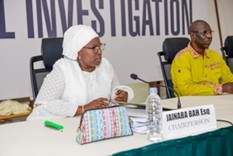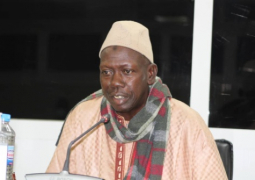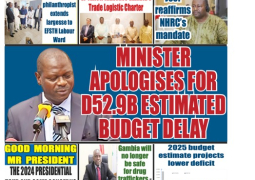
The testimonies revealed a pattern of missing documents, questionable payments, and procurement practices that appeared to flout official regulations.
The inquiry first questioned payments made for organising KEPT competitions.
Nyang admitted that only a single invoice existed, while Dibba confirmed that just one quotation had been obtained despite procurement rules requiring three.
Lead Counsel Patrick Gomez quickly pointed out the breach, pressing the witnesses on whether this was deliberate negligence.
Attention then shifted to a D250,000 voucher for clearing illegal dumpsites, which lacked attached documents. Dibba insisted that three quotations existed but were “detached,” while Nyang distanced himself from responsibility, saying he did not sign any of the documents.
The commission also scrutinised a D393,000 procurement of mangrove seedlings in 2023.
Dibba admitted that no requests for quotations had been sent to suppliers, and Nyang himself expressed surprise that most of the expected supporting documents were missing.
Equally troubling was a D50,000 single-sourced contract for rectifying architectural drawings at the Bakoteh dumpsite.
Nyang said the contractor was introduced by the Planning Department, but could not defend why procurement regulations were ignored. When pressed on why payments were made without due process, Nyang fell silent.
Further questions surrounded a D954,985 contract-part in tenders where no evidence showed the contracts committee had reviewed the files. Dibba argued that only contracts below D500,000 were referred to the committee, a statement that conflicted with procurement rules.
The inquiry also dealt with concerns over salary advances to Nyang, travel expenses of more than D50,000 for staff trips to Dakar and Spain with no retirement of funds, a D90,000 contract to Scoop Enterprises for architectural services without Planning Department involvement, and a D300,000 imprest to finance officer Aja Korra that lacked both request and retirement documents.
Lead Counsel repeatedly warned that the commission could only rely on what was presented, stressing that many vouchers were “inadequate” and unsupported. “Payments must be evidence-based,” he said, criticising the reliance on “beliefs” rather than proper procedures.
The chairperson also raised questions about the project’s financial reports, particularly an entry showing €29,050 spent on fuel supplements, despite fuel already allocated in the 2022 budget.
Throughout the hearing, Dibba and Nyang admitted that files were incomplete and processes often ignored. The inquiry now faces the task of determining how €3 million in KETP Project funds were managed, with growing fears that mismanagement and negligence may have been systemic.




